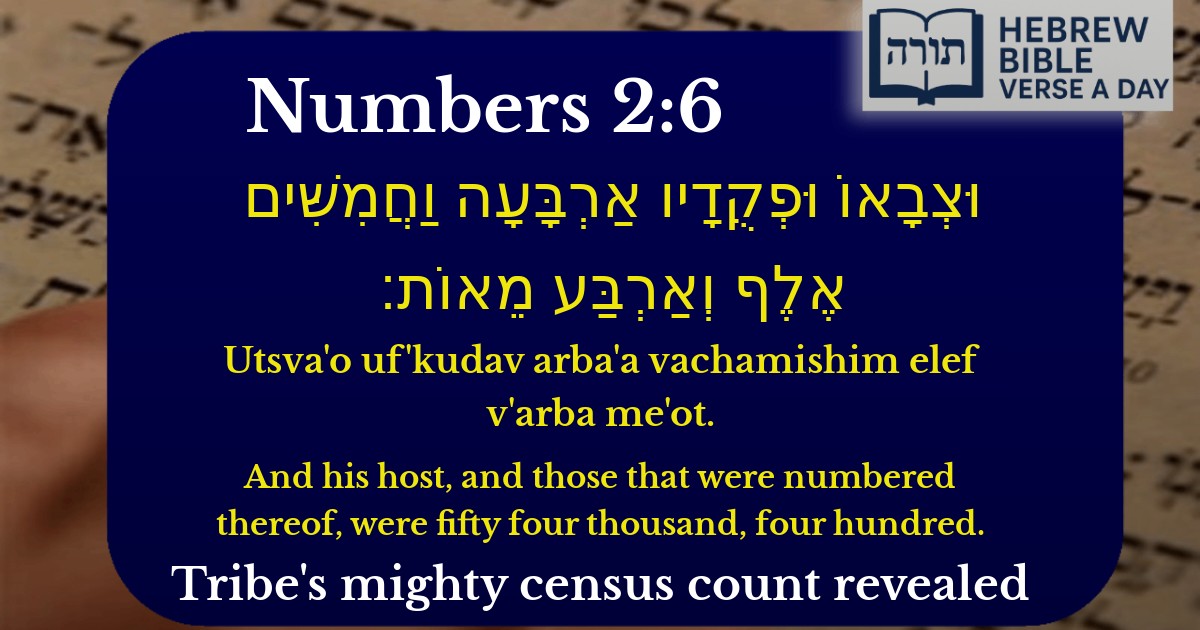Frequently Asked Questions
Q: What does Numbers 2:6 mean when it lists the count of the tribe of Reuben's army?
A: Numbers 2:6 records the number of men from the tribe of Reuben who were eligible for military service (ages 20 and up) during the census in the wilderness. The verse states there were 54,400 men. This count reflects the strength and organization of the tribes as they traveled and camped around the Mishkan (Tabernacle). Rashi explains that each tribe had its designated place and role in the encampment.
Q: Why is the counting of the tribes' armies important in the Torah?
A: The counting of each tribe's army in the Book of Numbers (Bamidbar) is important because it shows how Hashem organized Bnei Yisrael (the Children of Israel) for their journey through the wilderness. Each tribe had a specific position around the Mishkan, symbolizing unity and order. The Rambam teaches that this arrangement also reflected spiritual lessons about how the Jewish people should structure their lives around holiness.
Q: How does the number of soldiers in Reuben's tribe compare to other tribes?
A: Reuben's tribe had 54,400 soldiers (Numbers 2:6), which was neither the largest nor the smallest among the tribes. For example, Yehuda (Judah) had 74,600 (Numbers 2:4), while Menashe (Manasseh) had 32,200 (Numbers 2:21). The Midrash explains that these numbers reflect the unique blessings and roles each tribe received, as foretold by Yaakov (Jacob) in Bereishit (Genesis).
Q: What can we learn from the detailed counting of the tribes in the Torah?
A: The detailed counting teaches us that every individual in Klal Yisrael (the Jewish people) matters to Hashem. The Talmud (Bava Batra 8a) explains that counting shows love and importance—just as a person counts their precious possessions. Additionally, the orderly arrangement of the tribes around the Mishkan teaches the value of structure and unity in serving Hashem.
Q: Does the number of soldiers in Reuben's tribe have any symbolic meaning?
A: While the number 54,400 in Numbers 2:6 is a literal count, some commentaries find deeper meaning. The Ohr HaChaim notes that numbers in the Torah often hint at spiritual concepts. Reuben's count, combined with other tribes, reflects the totality of the Jewish people’s strength when united. The Midrash Tanchuma also connects tribal numbers to their historical roles and future redemption.


Context in the Torah
The verse (Bamidbar 1:41) describes the census count of the tribe of Asher during the wilderness journey. The total number of men aged 20 and older, fit for military service, was 54,400. This count is part of the larger census of the twelve tribes conducted by Moshe and Aharon at Hashem's command.
Rashi's Explanation
Rashi (Bamidbar 1:41) notes that the phrase "וּצְבָאוֹ וּפְקֻדָיו" ("his host and those that were numbered thereof") emphasizes that the count included every eligible individual in Asher's army. The term "צבא" (host) refers to their military role, while "פקודיו" (those numbered) highlights the precise accounting of each person.
Symbolism of the Number
The Midrash (Bamidbar Rabbah 2:10) discusses the significance of tribal numbers in the census. Asher's count of 54,400 reflects the tribe's blessing from Yaakov (Bereishit 49:20), "מֵאָשֵׁר שְׁמֵנָה לַחְמוֹ" ("from Asher his bread shall be fat"). The abundance in their number corresponds to their future prosperity in Eretz Yisrael, where their portion would yield rich produce.
Military Significance
Rambam (Hilchot Melachim 5:1) explains that the census served both practical and spiritual purposes:
Gematria Insight
The Baal HaTurim (Bamidbar 1:41) observes that the numerical value of "וְאַרְבַּע מֵאוֹת" (and four hundred) is 408, which equals "זת" (zayin-tav). This alludes to Asher's future abundance of olive oil (זית), as mentioned in Devarim 33:24.